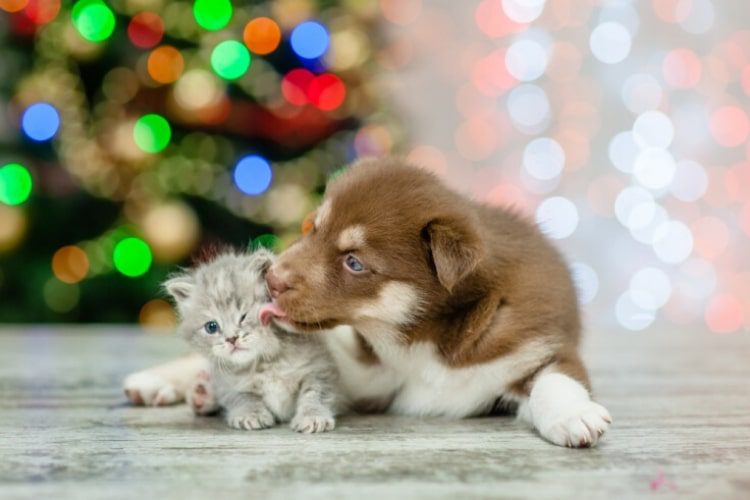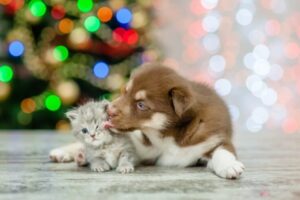Keep Pets Safe During Holidays


The winter holidays often bring festivities, travel, and a change in routines for pets and their owners. These activities and change in routine for pets contributes to making the period from Thanksgiving through the New Year one of the busiest at veterinary hospitals. The holiday season presents pets with lots of opportunities to get all kinds of trouble that can sicken them, cause them harm, or even lead to death.
Food & Beverage Items
Many food and beverage items that are often more available during holidays can be toxic to pets including:
- Yeast dough for baking
- Onions and garlic
- Grapes and raisins
- Chocolate – including candy bars and baked goods
- Sugar-free candy, food, gum, and other products that contain xylitol
- Fatty foods such as turkey skin, ham, and buttered vegetables
It’s always best to keep your pets on their regular diet. If you want to give pets a treat, provide a treat specifically made for pets. Other good options include plain, freshly cooked vegetables such as asparagus or green beans and raw or cooked carrots.
Drugs & Medications
Drugs and medications are also toxic to pets. Be sure to keep these items out of the reach of pets. This includes keeping any purses, bags, and coats that guests may bring into your home out of the reach of pets. These dangerous items include:
- Alcohol
- Marijuana
- Prescription drugs
- Over the counter medications
What to Do If…
If your pet consumes any problematic food or drugs, contact your veterinarian or a veterinary emergency center immediately. If possible, please provide the following information:
- Pet’s weight
- Pet’s age
- What was consumed
- Brand name if available
- Quantity consumed
- When items were consumed
Many times, the veterinary hospital can provide guidance about the danger to your pet and the next steps you should take. Prompt action often results in better outcomes and lower costs.
Holiday Decorations
Holiday decorations are often of interest to curious pets. Unfortunately, they are also a source of problems for pets.
The same things that make holiday decorations attractive to humans make them interesting to pets. Curious cats and dogs love to explore and nibble on new items or items they are not familiar with, leading to problems. Please be aware of the danger the following items present:
- Christmas trees – the needles, decorative flocking, and water in a fresh tree’s stand can cause an upset stomach and other health problems if ingested by pets.
- Ornaments, tinsel, and other holiday decorations can be tempting for pets to play with or eat. Broken ornaments or lights can lead to injuries. If a pet swallows an ornament or light, it can be toxic or result in intestinal tears or blockage, which may require surgery to remove.
- Electric cords for Christmas lights can be enticing to curious pets who can get burned chewing on them.
- Batteries, especially the smaller button-like types, are easily swallowed and can cause obstructions or, if punctured, burn the esophagus, mouth, or stomach.
- Flowers and plants are often toxic to cats and dogs. Lilies are extremely toxic to cats and should not be allowed in homes with cats. Amaryllis, chrysanthemums, holly, mistletoe, and pine, are among the common holiday plants that can be dangerous and even poisonous to pets who decide to eat them. Poinsettias, despite their reputation, are not toxic to cats and dogs, but they can cause stomach upset and mouth irritation.
Travel Tips for Pets
If you are taking a trip with your pets this season, we recommend that you:
- Ensure your pet has a microchip and an up-to-date collar identification tag that provides its name, phone number, and address. Check with the microchip company to be sure all contact information is up to date.
- When traveling in a motor vehicle, make certain your pet is secure in a harness, crate, or carrier. Ideally, get your pet accustomed to the harness, crate, or carrier prior to traveling.
- Be certain you pack plenty of your pet’s food and medication and a copy of their medical records. Have recent photos of your pet – headshot, full-body, and identifying characteristics – to help identify it should it become lost.
- If your pet is staying at a boarding facility, be sure your pet is up to date on its vaccinations to protect it from the dog flu and other contagious illnesses.
- Due to COVID-19 regulations, pet travel on airplanes is extremely limited. If you are flying with your pet, stay alert to any changes in the rules and requirements before your trip.
Other Tips
Other tips for optimal pet health:
- Keep pets away from doors or keep them secure and under the control of a responsible adult as guests come and go.
- Provide a quiet space where shy pets can be away from people. Limit the amount of time puppies, kittens and senior pets have with guests. Allow them to get plenty of rest.
- Keep purses, bags, and coats out of the reach of curious pets who may eat candy, gum, medications, and other objects they may find.
- Keep handy the phone number and location of the closest veterinary emergency center near your home and anywhere you are traveling.
Emergency Care
Please be patient: If your pet needs urgent or emergency care, especially during the holidays, please be patient. Veterinarians and hospitals are working at or beyond capacity, and even with their best efforts, waiting time can be long. Please know that staff and doctors are doing everything they can to provide the best care for your pet. Remember, prompt action can result in better outcomes and lower costs. So if your pet has a problem, don’t wait to call West Loop Veterinary Care at 312-421-2275.
West Loop:
(312) 421-2275
Streeterville:
(312) 766-5959
